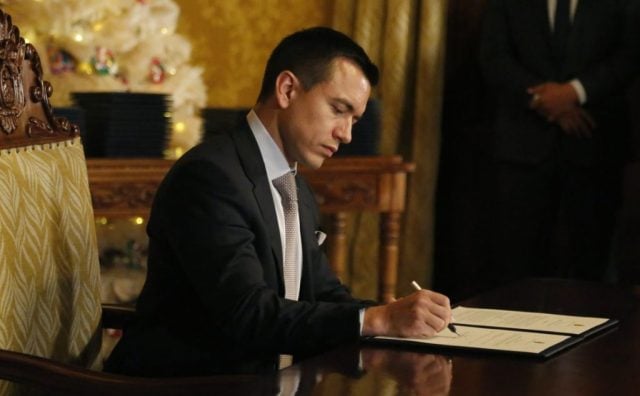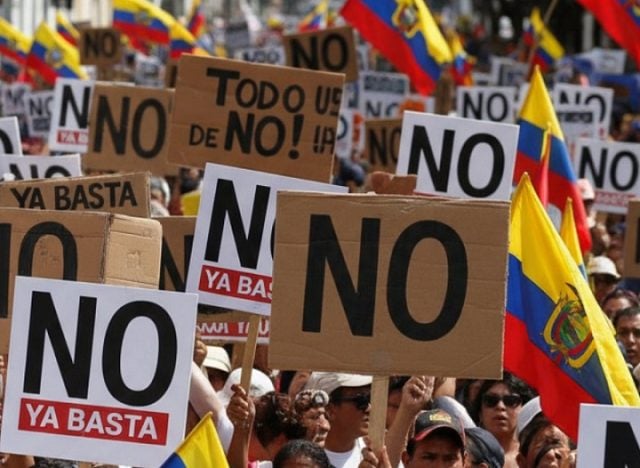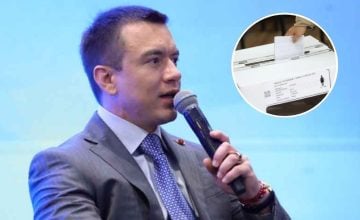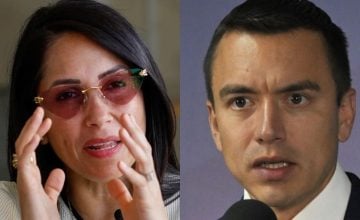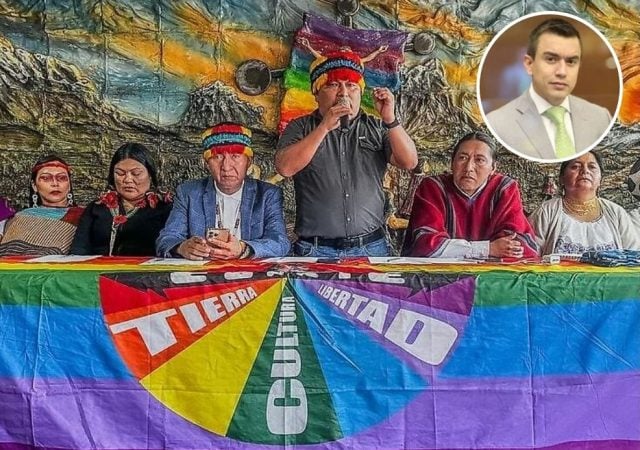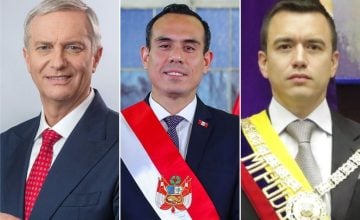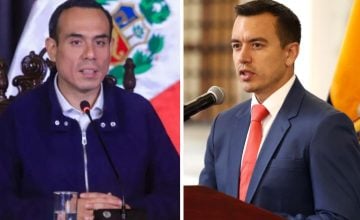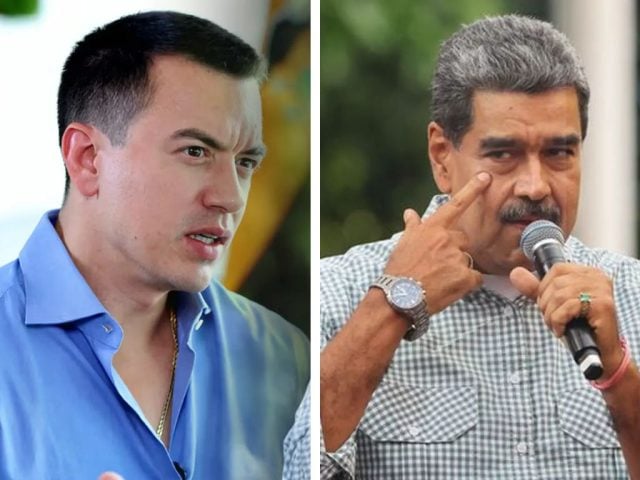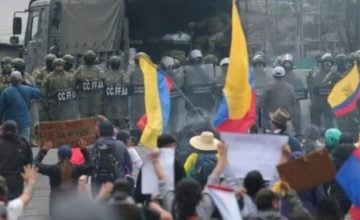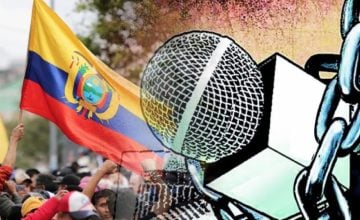Original article: Constituyente “a la medida” en Ecuador: Noboa busca concentrar poder y debilitar contrapesos
Ecuadorians will head to the polls on Sunday, November 16, to participate in a popular referendum that could pave the way for a new Constitution. The question, driven by President Daniel Noboa, seeks to convene a Constituent Assembly amidst what experts describe as a strategy to centralize power in the Executive and weaken institutional checks and balances.
The process occurs in a context of escalating conflict between the Government and the Constitutional Court, which has blocked several initiatives related to security and public order presented by the right-wing president and previously approved without much resistance by an Assembly controlled by the ruling party. As such, the Court deemed those initiatives poorly justified.
Noboa has labeled the judges as «enemies of the people» and advocates for the Constituent Assembly by arguing that the current Constitution, written in 2008 during Rafael Correa’s presidency, has become outdated and lacks sufficient tools to address the country’s security crisis.
Referendum Amid Institutional Tensions
The path to the referendum has not been without controversy. Initially, Noboa attempted to initiate the process without the prior ruling from the Constitutional Court, as mandated by Ecuadorian law. In September 2025, the president directly submitted a request to the National Electoral Council (CNE) for the referendum, igniting an institutional crisis.
«The obstruction that certain politicized entities are trying to impose on the changes this country needs will not deter the will of the Ecuadorian people,» stated the Presidency in a communiqué reflecting the tension with the high court.
Ultimately, on September 24, 2025, the Constitutional Court issued a «favorable ruling for the convening of a Constituent Assembly,» clearing the way for the vote on November 16. In its ruling, the Court emphasized that this process «is not a strategy of the current power or a political ploy, but a matter of historical responsibility, especially in a country where constitutions have been frequently amended.»
Questions of the Referendum
The popular referendum includes four questions that could significantly alter Ecuador’s political and constitutional framework.
The primary question states: «Do you agree to convene and install a Constituent Assembly, whose representatives will be elected by the Ecuadorian people, according to the electoral rules outlined in the attached Constituent Statute, to draft a new Constitution for the Republic, which will come into effect only if subsequently approved by the Ecuadorians in a referendum?»
Additionally, the referendum proposes to eliminate the constitutional ban enacted since 2008 that prevents the establishment of foreign military bases or installations for military purposes in Ecuador; eliminate the obligation for the State to provide financial resources to political parties and movements through the Permanent Party Fund; and modify Article 118 of the Constitution to reduce the number of Assembly members in the National Assembly from 151 to 73.
The Design of a Tailored Constituent Assembly
The model proposed by Daniel Noboa envisions a Constituent Assembly of 80 members: 24 national, 50 provincial, and 6 from overseas constituencies. This body would have 180 days, extendable by 60 more, to draft a new constitutional text, which would then have to be submitted for referendum approval.
The election system stipulates that «the vote will be in closed and blocked lists. Seats will be allocated applying the D’Hondt method,» a system critics argue «favors the strongest political parties by allowing them greater representation,» reported Radio Pichincha.
The president has sparked controversy by stating that he will present the details of the reform only after November 17, if the «yes» vote wins in the referendum. In the meantime, he has revealed his desire for a text of a maximum of 180 articles and even suggested using Artificial Intelligence in its drafting, which has raised eyebrows.
Although the right-wing president insists his role is «citizen, not constituent,» he has already mentioned potential members, including jurists, businesspeople, and military personnel with constitutional knowledge. Among the mentioned profiles are his mother, Legislator Anabella Azín, who has a high absenteeism rate in the Assembly, his friend and National Assembly president, Niels Olsen; former Attorney General Diana Salazar; former Government Minister José De La Gasca; Assembly member Nataly Morillo; and Admiral Jaime Vela.
According to Noboa, once the text is approved by an absolute majority of the Constituent Assembly members, it will be sent to the National Electoral Council, which must convene a new popular referendum for ratification or rejection within 60 days.
This entire process could take between 12 and 15 months. The three voting days, along with the operation of the Assembly for six to eight months, could cost more than 200 million dollars.
Democratic Renewal or Power Concentration?
Noboa’s administration argues that a new Constitution is necessary to tackle the institutional crisis, violence, and the loss of trust in the justice system. According to the official text of the decree, the process aims to «refound the Ecuadorian State.»
However, critics warn about the risks of the Constituent Assembly. Sybel Martínez, a lawyer and human rights advocate, asserts that a new Constitution is unnecessary and that the initiative appears designed to «disable checks and balances and consolidate unchecked power.»
Among the dangers highlighted by Martínez are the strengthening of the Executive at the expense of other branches of government, leading to a «reinforced hyper-presidentialism»; the limitation of the functions of the Constitutional Court, which has become the main institutional counterbalance to the right-wing president; the reduction in size and oversight capacity of the National Assembly; and the opening up of privatizations in strategic sectors and public services such as water, energy, and health.
Moreover, in statements to Radio Pichincha, she warned that «the project could commercialize protected areas, compromising environmental protection principles.»
Constitutional lawyer André Benavides echoed these warnings and contended that «there are no legal or political grounds to justify a new Constituent Assembly.»
In his view, this lack of clarity could lead to the dismantling of the current Constitution that guarantees fundamental rights such as access to health, public education, and work, as well as environmental rights and constitutional control that ensures the balance of powers.
Meanwhile, economist Alberto Acosta, former president of the Montecristi Constituent Assembly that drafted the 2008 Constitution, suggested that Noboa “seems to be asking for a blank check.”
He believes the president seeks to “replace a Constitution that discomforts the elite because it stripped them of privileges and established limits on economic and political power.”
Journalist Leonardo Parrini pointed out that the initiative “opens the door to a regression of acquired rights and a return to the old country of privileges and inequities.”
In the same vein, lawyer María Dolores Miño warned that “once a Constituent Assembly is established, nothing can prevent the compromise of rights such as public higher education, free healthcare, or the rights of Nature,” as reported by Prensa Latina.
Additionally, jurist Mónica Luzárraga argued that beyond the legal debate, what is at stake is the social memory of Ecuador.
“The Constitution was built through dialogue and historical struggles. Let us not allow it to be taken from us,” she stated, as quoted by the aforementioned media.
Historian Juan Paz y Miño suggested in a text on Ecuador’s constitutional history that “by taking advantage of this referendum, the country could enshrine a new plutocratic era that solidifies the dominance of elites over the State and the economy.”
The Million-Dollar Cost of an Uncertain Process
The constitutional process, which includes the popular referendum, election of assembly members, operation of the Assembly for six to eight months, and approval referendum, could cost around 200 million dollars, a figure that reignites the debate over the State’s fiscal priorities.
While the Government insists on the need to «completely reconfigure the State», critics have questioned whether a lengthy, costly, and uncertain constitutional process is the best response to the urgent economic and social needs the country faces.
«That amount equates to the budget necessary to equip hospitals lacking medicine, pay debts to outsourced workers, or repair ambulances and operating rooms out of service,» Radio Pichincha indicated.
With a population exceeding 18 million and an electoral roll of over 13.9 million voters, Ecuadorians hold a decision that could mark a turning point in the democratic history of their nation.
